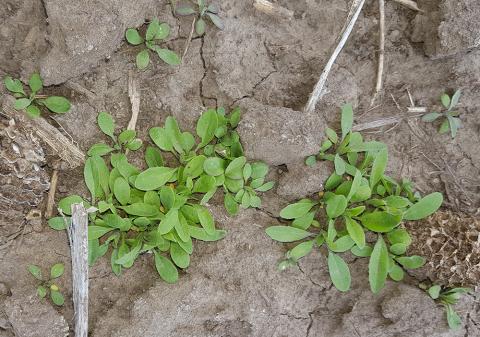Which Dicamba Product Should I Use as a Burndown Before Planting Soybean?
April 16, 2019
Several growers have asked: Can dicamba products such as Banvel, Clarity, and DiFlexx be applied to terminate broadleaf cover crop species and broadleaf weeds immediately before planting soybean?
CropWatch Podcast on Spring Burndown Applications
March 22, 2019
On the latest Nebraska CropWatch podcast Extension Educator Michael Sindelar interviews Weed Specialist Amit Jhala about factors to address with burndown herbicide applications.
2019 FAQ for RUP Dicamba Herbicides (FeXapan™, Engenia® and XtendiMax®)
January 30, 2019
"If I had RUP dicamba training in 2018, do I need training in 2019?" The answer to that question, which is "Yes," and other questions about training and new application requirements for the three RUP dicamba products are covered in this FAQ.
Pollen-Mediated Gene Flow and Transfer of Herbicide-Resistant Alleles
January 22, 2019
Pollen-mediated gene flow at a distance could allow the spread of rare herbicide-resistant alleles and favor the evolution of multiple herbicide-resistant biotypes through the accumulation of different resistant genes in an individual weed or weed population. From the Nebraska Crop Management Conference Proceedings.
Management of Glyphosate-Resistant Marestail in Fall
October 25, 2018
For successful marestail management in the fall, apply herbicides after harvest while weather conditions remain favorable (air temperature above 50°F). Effective control now may negate the need for an early spring burndown application.
Q&A: How Can I Control Winter Annuals Now Before Planting Wheat?
October 24, 2018
What is your herbicide recommendation for someone who wants to plant wheat, but has a lot of winter annuals coming up, including marestail?
Field Case Study of Dicamba-Injured Soybeans using Forensic Analysis
August 8, 2018
A field of dicamba-injured soybeans is used as an example to demonstrate the forensic analysis method to determine when dicamba exposure occurred.
Soybean Production and Dicamba Use Survey
August 3, 2018
Growers, crop consultants, and other stakeholders are invited to take an online survey on new soybean production and weed management systems.







